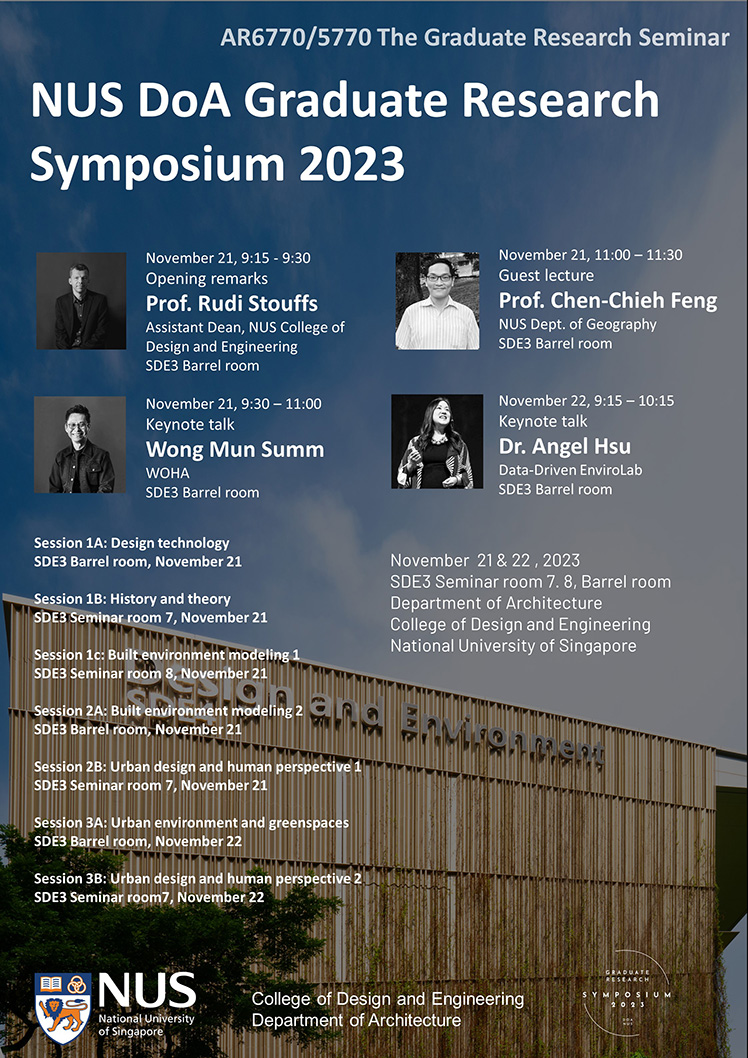Graduate Research Symposium 2023
Name of Event/Lecture
Department of Architecture (DoA) Graduate Symposium 2023
Location
SDE3 - Barrel Room, SDE3 - Seminar Room 7, SDE3 - Seminar Room 8

The 2023 NUS Department of Architecture Graduate Research Symposium held on 21-22 November featured distinguished speakers and extensive presentations by both renowned professionals and students.
- Keynotes from Mr. Wong Mun Summ emphasized WOHA’s ‘Form Follows Systems’ approach to urban design, highlighting its focus on holistic well-being, incorporating natural elements, and enhancing ecosystem services.
- Dr. Feng Chen-Chieh’s presentation centered on human-centered Geographic Information Systems (GIS) and their role in understanding human dynamics. It cites examples of transportation data during COVID-19 and community networks impacting disease spread, emphasizing spatial structures in public health.
- Dr. Angel Hsu discussed cities’ dual role in the climate crisis, stressing their contribution to the issue and potential as hubs for innovative climate solutions. She highlighted using data science to assess cities’ impacts on global climate efforts and sustainable urban development.
Additionally, research presentations covered diverse themes:
- Session 1A explores energy efficiency, food production, and building noise reduction. It focuses on urban digital twins for energy simulations, vegetation and PV designs’ effects, and indoor greenery for noise mitigation, as well as floor effects on sound levels.
- Section 1B covers architecture and urban studies, highlighting socialist China’s impact on global socialism, architectural development in Portuguese Macau, housing policy changes in Shenzhen, Singapore, and Hong Kong, and industrial park urbanization in Singapore and China.
- Session 1C explored built environment modeling, covering urban night-time lighting, impacts on active transportation, circular construction concepts, and AI’s role in spatial data generation, employing innovative techniques like AI and street view imagery.
- Session 2A on “Built Environment Modeling” covered urban flooding solutions for densely populated areas, advanced evacuation routes using urban data, and pedestrian pathway design informed by urban morphology.
- Session 2B on “Urban Design and the Human Perspective” explored digital empowerment for future city comfort, delving into AI-driven design tech, park activities in dense areas, and heatwaves’ impact on Asian cities’ vitality and human behavior.
- Section 3A explores the urban environment and greenscapes, studying urban greenery’s impact on soundscape, tree placements’ thermal effects via the UT&C model, urban design’s influence on bird diversity, and the interdependence of nature in space production.
- Section 3B focused on urban design for human comfort and student performance. Studies included using public spaces as tools to manage heat stress, using blue-green spaces to enhance health and well-being, and addressing anxieties’ impact on academic performance to improve Architecture studio pedagogy.
Please click here for the programme.
Photos from the event:













